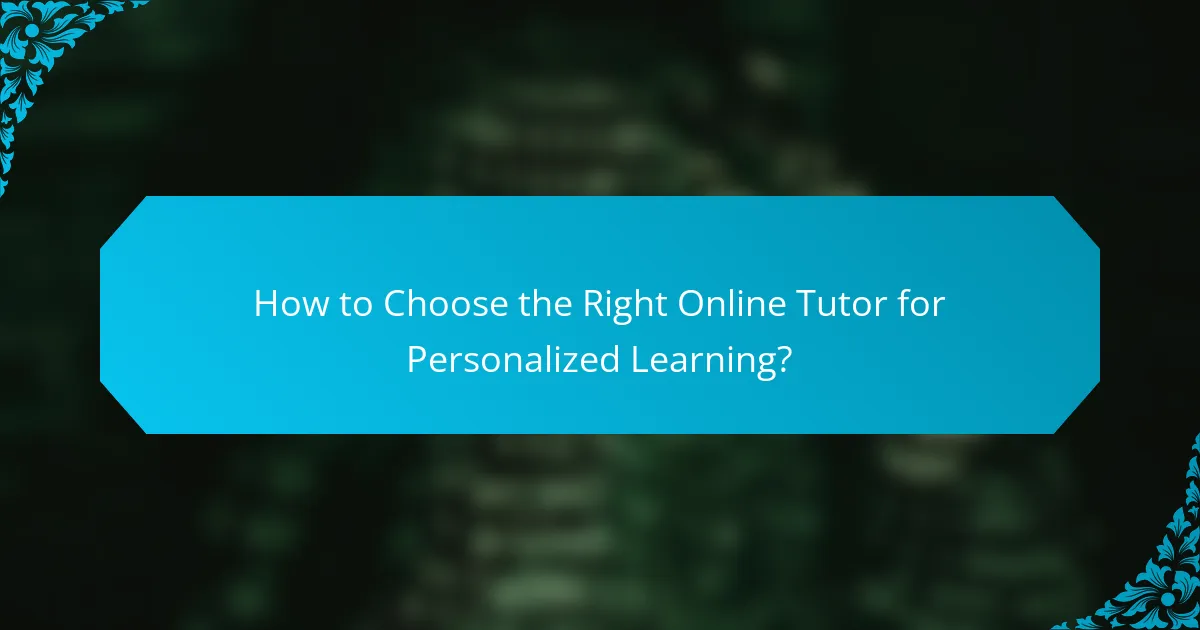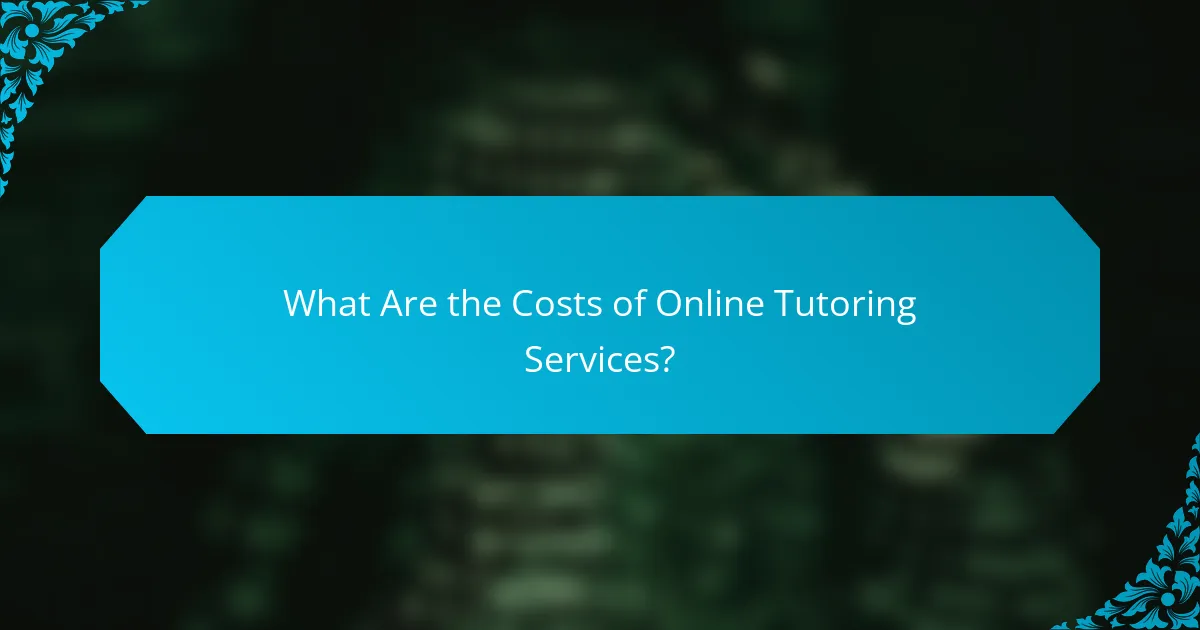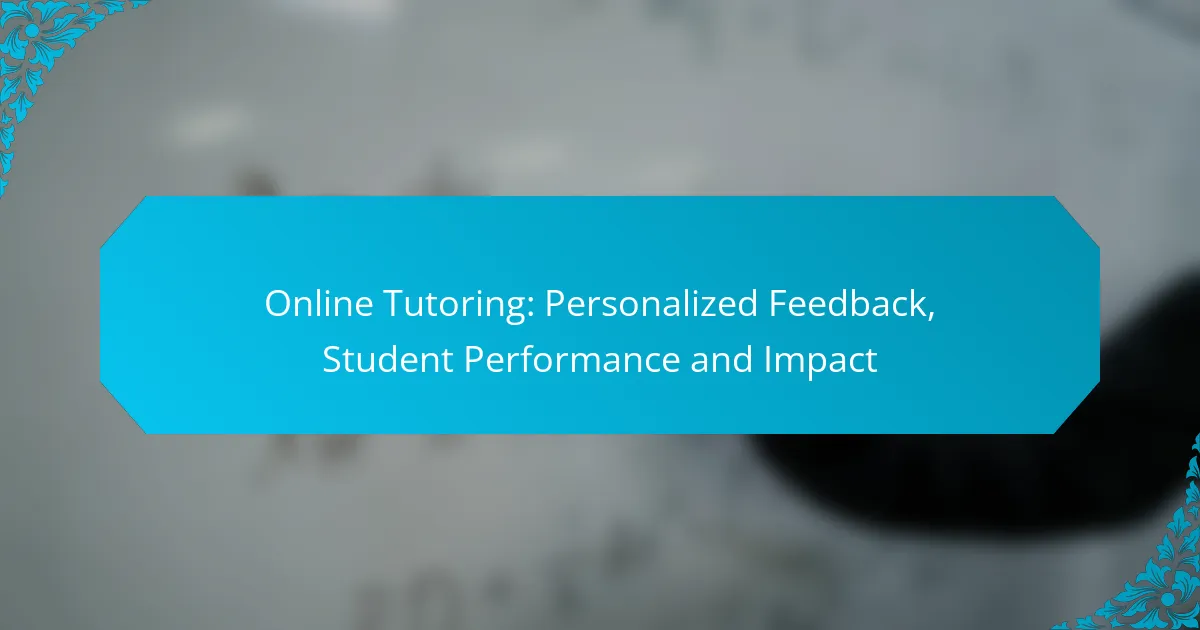Online tutoring offers a unique opportunity to enhance student performance through personalized educational experiences tailored to individual learning needs. By providing targeted feedback, these platforms help students grasp concepts more effectively and stay engaged, ultimately leading to improved academic outcomes.

How Does Online Tutoring Improve Student Performance?
Online tutoring enhances student performance by providing tailored educational experiences that cater to individual learning needs. This personalized approach fosters better understanding and retention of material, ultimately leading to improved academic outcomes.
Personalized learning plans
Personalized learning plans are customized strategies designed to meet each student’s unique educational needs. These plans take into account the student’s strengths, weaknesses, and learning preferences, allowing tutors to focus on areas that require improvement.
For instance, a student struggling with algebra may receive a plan that emphasizes foundational concepts before progressing to more complex topics. This targeted approach can significantly boost confidence and competence in the subject matter.
Real-time feedback mechanisms
Real-time feedback mechanisms enable students to receive immediate responses to their questions and performance. This instant communication helps clarify misunderstandings and reinforces learning as it occurs.
For example, during a live session, a tutor can quickly address a student’s error in problem-solving, guiding them through the correct process. This timely intervention can prevent the development of misconceptions and enhance overall comprehension.
Progress tracking tools
Progress tracking tools allow both students and tutors to monitor academic growth over time. These tools often include dashboards that display performance metrics, completed assignments, and areas needing attention.
By regularly reviewing progress, students can stay motivated and set achievable goals. Tutors can adjust their teaching strategies based on this data, ensuring that the learning experience remains effective and aligned with the student’s evolving needs.
Adaptive learning technologies
Adaptive learning technologies use algorithms to tailor educational content based on a student’s performance and engagement levels. These systems adjust the difficulty and type of material presented, ensuring that students are challenged appropriately without feeling overwhelmed.
For instance, if a student excels in reading comprehension, the system may introduce more complex texts to further develop their skills. This dynamic approach keeps students engaged and promotes continuous improvement in their learning journey.

What Are the Benefits of Personalized Feedback in Online Tutoring?
Personalized feedback in online tutoring significantly enhances learning by addressing individual student needs and performance. This tailored approach helps students grasp concepts more effectively, stay engaged, and develop specific skills relevant to their educational goals.
Enhanced understanding of concepts
Personalized feedback allows tutors to clarify misunderstandings and reinforce key concepts tailored to each student’s learning style. For example, a student struggling with algebra may receive targeted explanations and practice problems that directly address their specific challenges.
This focused approach not only improves comprehension but also builds confidence, as students can see their progress in real time. By receiving feedback that is relevant to their unique learning journey, students are more likely to retain information and apply it effectively in future tasks.
Increased student engagement
When students receive personalized feedback, they feel more valued and understood, which can lead to higher levels of engagement. Tutors can create interactive sessions that incorporate the student’s interests, making learning more enjoyable and relevant.
For instance, a tutor might use a student’s favorite subject or hobby as a context for math problems, which can spark curiosity and motivation. Engaged students are more likely to participate actively in their learning and take ownership of their academic progress.
Targeted skill development
Personalized feedback enables tutors to identify specific areas where a student needs improvement and provide targeted exercises to develop those skills. This focused skill development is crucial for mastering complex subjects and achieving academic success.
For example, if a student struggles with writing, a tutor can provide feedback on grammar, structure, and style, along with tailored writing assignments. This approach not only addresses weaknesses but also allows students to build a strong foundation for future learning.

Which Online Tutoring Platforms Offer Personalized Feedback?
Several online tutoring platforms provide personalized feedback to enhance student learning. These platforms utilize various methods to tailor their support, ensuring that students receive guidance suited to their individual needs.
Khan Academy
Khan Academy offers personalized feedback through its adaptive learning technology. As students progress through lessons, the platform assesses their understanding and provides tailored exercises to address specific weaknesses.
Students can track their progress with detailed reports, which highlight areas needing improvement. This feedback helps learners focus on concepts they struggle with, promoting a more effective learning experience.
Chegg Tutors
Chegg Tutors connects students with live tutors who provide real-time, personalized feedback during sessions. Tutors can assess a student’s understanding on the spot and adjust their teaching methods accordingly.
Additionally, Chegg offers a question-and-answer feature where students can submit queries and receive detailed explanations. This allows for ongoing support outside of live sessions, reinforcing learning through personalized responses.
Wyzant
Wyzant allows students to choose tutors based on their specific needs, ensuring personalized feedback tailored to individual learning styles. Tutors create customized lesson plans and provide insights based on each student’s performance.
Students can also leave reviews and feedback on their tutoring experience, which helps future learners select the right tutor for their needs. This peer feedback system enhances the personalization of the learning experience.
VIPKid
VIPKid specializes in teaching English to children, offering personalized feedback through one-on-one classes with native speakers. Each lesson is tailored to the child’s proficiency level, ensuring that feedback is relevant and constructive.
Teachers provide immediate feedback during lessons, along with detailed performance reports after each session. This approach helps parents understand their child’s progress and areas for improvement, fostering a supportive learning environment.

How to Choose the Right Online Tutor for Personalized Learning?
Selecting the right online tutor for personalized learning involves evaluating their qualifications, teaching methods, and subject expertise. A good match can significantly enhance a student’s educational experience and performance.
Assess tutor qualifications
Start by reviewing the tutor’s educational background and certifications. Look for degrees in the subject area they teach, as well as any relevant teaching credentials or specialized training.
Consider their experience level, particularly in online tutoring. A tutor with several years of experience may be more adept at engaging students and adapting to their individual learning styles.
Evaluate teaching methodologies
Different tutors employ various teaching methodologies, such as inquiry-based learning, direct instruction, or collaborative learning. Understanding these approaches can help you determine which aligns best with the student’s learning preferences.
Ask potential tutors how they assess student progress and adjust their methods accordingly. A tutor who regularly seeks feedback and modifies their approach can provide a more personalized learning experience.
Consider subject expertise
Ensure the tutor has a strong grasp of the specific subject matter. This is particularly important for advanced topics where a deep understanding is necessary for effective teaching.
Inquire about their familiarity with the curriculum and any standardized tests relevant to the subject. A tutor who understands the local educational standards can better prepare students for success in their studies.

What Are the Costs of Online Tutoring Services?
The costs of online tutoring services vary widely based on factors like the tutor’s experience, subject matter, and the format of the service. Generally, prices can range from around $15 to $100 per hour, depending on these variables.
Hourly rates comparison
Hourly rates for online tutoring typically range from $20 to $80. For example, tutors specializing in advanced subjects like calculus or SAT preparation may charge higher rates, while those focusing on elementary education might be on the lower end of the scale. It’s essential to consider the tutor’s qualifications and the complexity of the subject when evaluating costs.
Additionally, platforms that aggregate tutors may offer competitive pricing, often providing a range of options to suit different budgets. Comparing rates across various platforms can help identify the best value for your needs.
Subscription models
Subscription models for online tutoring services allow students to pay a monthly fee for a set number of sessions or unlimited access. Prices for these subscriptions can range from $50 to $300 per month, depending on the number of sessions included and the level of personalization offered.
These models can be cost-effective for students who require regular assistance, as they often provide a lower per-session rate compared to hourly bookings. However, it’s crucial to assess the terms of the subscription, including cancellation policies and session rollover options.
Package deals
Package deals are another popular option, where students purchase a bundle of tutoring sessions at a discounted rate. For instance, a package of five sessions might cost between $100 and $350, depending on the tutor’s expertise and the subject matter.
When considering package deals, evaluate the total cost against your expected usage. This approach can save money in the long run, especially if you anticipate needing multiple sessions. Always check if the package includes flexibility in scheduling and whether unused sessions can be refunded or rolled over.

How Does Online Tutoring Impact Learning Outcomes?
Online tutoring significantly enhances learning outcomes by providing personalized feedback and tailored instruction. This method allows students to engage with material at their own pace, leading to improved understanding and retention of knowledge.
Personalized Feedback
Personalized feedback in online tutoring is crucial for student development. Tutors can assess individual performance and provide specific guidance, addressing strengths and weaknesses effectively. This tailored approach helps students grasp complex concepts more thoroughly.
For instance, a student struggling with algebra may receive targeted exercises and explanations that focus on their particular areas of difficulty. This focused feedback can lead to quicker improvements in their understanding and skills.
Student Performance
Student performance in online tutoring often shows marked improvement compared to traditional methods. The flexibility of online platforms allows learners to revisit lessons and practice at convenient times, which can enhance mastery of subjects.
Research indicates that students who engage in online tutoring typically achieve higher grades and test scores. Regular assessments and progress tracking help maintain motivation and accountability, contributing to better overall performance.
Impact on Learning
The impact of online tutoring on learning extends beyond academic performance. It fosters self-directed learning habits, encouraging students to take ownership of their education. This independence can lead to increased confidence and a more proactive approach to learning.
Moreover, online tutoring can accommodate various learning styles, making education more inclusive. For example, visual learners may benefit from video tutorials, while auditory learners might excel with interactive discussions. This adaptability enhances the overall educational experience.
